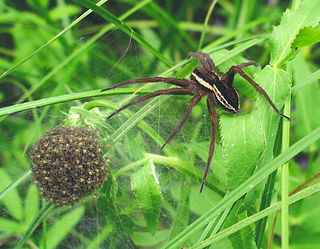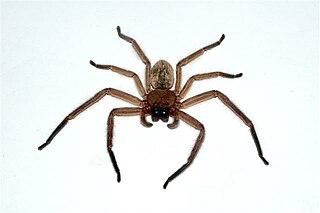
The genus Argiope includes rather large spiders that often have a strikingly coloured abdomen. These spiders are distributed throughout the world. Most countries in tropical or temperate climates host one or more species that are similar in appearance. The etymology of Argiope is from a Latin word argentum meaning silver. The carapace of Argiope species is typically covered in silvery hairs, and when crawling in the sun, they reflect it in a way that gives them a metallic, white appearance.

Dolomedes is a genus of large spiders of the family Pisauridae. They are also known as fishing spiders, raft spiders, dock spiders or wharf spiders. Almost all Dolomedes species are semiaquatic, with the exception of the tree-dwelling D. albineus of the southeastern United States. Many species have a striking pale stripe down each side of the body.

Missulena is a genus of mygalomorph spiders in the family Actinopodidae. It was first described by Charles Walckenaer in 1805, and is a senior synonym of Eriodon. M. tussulena is found in Chile, but the rest are indigenous to Australia. They are sometimes referred to as "mouse spiders" from the now-disproven belief that they dig deep burrows similar to those of mice. Scotophaeus blackwalli is also called a "mouse spider", but it is smaller and not closely related.

Delena is a genus of South Pacific huntsman spiders that was first described by Charles Athanase Walckenaer in 1837.
Habronestes is an ant-eating spider genus that occurs only in Australia.
Battalus is a genus of Australian corinnid sac spiders first described by Ferdinand Karsch in 1878. Originally placed with the ground spiders, it was moved to the Corinnidae in 2015.

Arkys, also known as triangular spider or ambush spider, is a genus of Australian araneomorph spiders in the family Arkyidae, first described by Charles Athanase Walckenaer in 1837. They are often small, with a triangular shaped abdomen, and are found in Australia and some of its surrounding islands. They don't build webs, but can often be found on leaves and tips of flower heads. Their egg sacs are pinkish-orange and spherical, and are made late in the summer.

Desis is a genus of intertidal spiders that was first described by Charles Athanase Walckenaer in 1837. Species of the genus are found in Australasia, the Pacific, Japan, eastern and southern Africa, and India. They are marine spiders, living in the intertidal zone and only emerging at the ebb tide to hunt for invertebrates including shrimp. When submerged during high tides, they stay in an air chamber sealed with silk, and breathe its air.

Arkyidae, also known as triangular spiders, is a family of araneomorph spiders first described by Ludwig Carl Christian Koch in 1872 as a subfamily of Araneidae, and later elevated to a full family in 2017.
Poecilipta is a genus of South Pacific corinnid sac spiders first described by Eugène Simon in 1897.

Dolophones is a genus of orb-weaver spiders first described by Charles Athanase Walckenaer in 1837.

Neosparassus is a genus of huntsman spiders first described by Henry Roughton Hogg in 1903. Members of this genus most closely resemble those of Heteropoda, except that the cephalothorax is high, peaking between the midpoint and the eyes, before sloping toward the back. This angle causes the front of these spiders to appear more prominent than it actually is.

Anzacia is a genus of South Pacific ground spiders that was first described by R. de Dalmas in 1919.
Storena is a genus of ant spiders first described by Charles Athanase Walckenaer in 1805.










